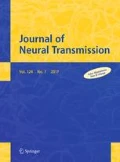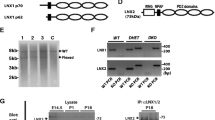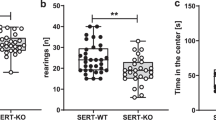Abstract
The organic cation transporter 3 (OCT3; synonymous: extraneuronal monoamine transporter, EMT, Slc22a3) encodes an isoform of the organic cation transporters and is expressed widely across the whole brain. OCTs are a family of high-capacity, bidirectional, multispecific transporters of organic cations. These also include serotonin, dopamine and norepinephrine making OCTs attractive candidates for a variety of neuropsychiatric disorders including anxiety disorders. OCT3 has been implicated in termination of monoaminergic signalling in the central nervous system. Interestingly, OCT3 mRNA is however also significantly up-regulated in the hippocampus of serotonin transporter knockout mice where it might serve as an alternative reuptake mechanism for serotonin. The examination of the behavioural phenotype of OCT3 knockout mice thus is paramount to assess the role of OCT3. We have therefore subjected mice lacking the OCT3 gene to a comprehensive behavioural test battery. While cognitive functioning in the Morris water maze test and aggression levels measured with the resident–intruder paradigm were in the same range as the respective control animals, OCT3 knockout animals showed a tendency of increased activity and were significantly less anxious in the elevated plus-maze test and the open field test as compared to their respective wild-type controls arguing for a role of OCT3 in the regulation of fear and anxiety, probably by modulating the serotonergic tone in limbic circuitries.




Similar content being viewed by others
References
Amara SG, Kuhar MJ (1993) Neurotransmitter transporters: recent progress. Annu Rev Neurosci 16:73–93
Belzung C, Griebel G (2001) Measuring normal and pathological anxiety-like behaviour in mice: a review. Behav Brain Res 125(1–2):141–149
Bengel D, Murphy DL, Andrews AM, Wichems CH, Feltner D, Heils A, Mossner R, Westphal H, Lesch KP (1998) Altered brain serotonin homeostasis and locomotor insensitivity to 3,4-methylenedioxymethamphetamine (“Ecstasy”) in serotonin transporter-deficient mice. Mol Pharmacol 53(4):649–655
Busch AE, Karbach U, Miska D, Gorboulev V, Akhoundova A, Volk C, Arndt P, Ulzheimer JC, Sonders MS, Baumann C, Waldegger S, Lang F, Koepsell H (1998) Human neurons express the polyspecific cation transporter hOCT2 which translocates monoamine neurotransmitters, amantadine, and memantine. Mol Pharmacol 54:342–352
Carobrez AP, Bertoglio LJ (2005) Ethological and temporal analyses of anxiety-like behavior: the elevated plus-maze model 20 years on. Neurosci Biobehav Rev 29(8):1193–1205
Chen Z, Skolnick P (2007) Triple uptake inhibitors: therapeutic potential in depression and beyond. Expert Opin Investig Drugs 16(9):1365–1377
Chomczynski P, Sacchi N (1987) Single-step method of RNA isolation by acid guanidinium thiocyanate-phenol-chloroform extraction. Anal Biochem 162(1):156–159
Crawley JN (1999) Behavioral phenotyping of transgenic and knockout mice: experimental design and evaluation of general health, sensory functions, motor abilities, and specific behavioral tests. Brain Res 835(1):18–26
D’Hooge R, De Deyn PP (2001) Applications of the Morris water maze in the study of learning and memory. Brain Res Brain Res Rev 36(1):60–90
Dell’Osso B, Nestadt G, Allen A, Hollander E (2006) Serotonin–norepinephrine reuptake inhibitors in the treatment of obsessive–compulsive disorder: a critical review. J Clin Psychiatry 67(4):600–610
Faludi G (1994) Buspirone: a new possibility in the treatment of anxiety. Orv Hetil 135(33):1807–1813
Friedgen B, Wolfel R, Russ H, Schomig E, Graefe KH (1996) The role of extraneuronal amine transport systems for the removal of extracellular catecholamines in the rabbit. Naunyn Schmiedebergs Arch Pharmacol 354(3):275–286
Giros B, Jaber M, Jones SR, Wightman RM, Caron MG (1996) Hyperlocomotion and indifference to cocaine and amphetamine in mice lacking the dopamine transporter. Nature 379(6566):606–612
Grohmann M, Trendelenburg U (1984) The substrate specificity of uptake2 in the rat heart. Naunyn Schmiedebergs Arch Pharmacol 328(2):164–173
Gründemann D, Censarek P (2003) PCR-generated truncated positive control for PCR screening of embryonic stem cell clones. Biotechniques 34(6):1130−1132, 1134
Gründemann D, Schömig E (2000) Gene structures of the human non-neuronal monoamine transporters EMT and OCT2. Hum Genet 106(6):627–635
Grundemann D, Babin-Ebell J, Martel F, Ording N, Schmidt A, Schomig E (1997) Primary structure and functional expression of the apical organic cation transporter from kidney epithelial LLC-PK1 cells. J Biol Chem 272(16):10408–10413
Grundemann D, Breidert T, Spitzenberger F, Schomig E (1998a) Molecular structure of the carrier responsible for hepatic uptake of catecholamines. Adv Pharmacol 42:346–349
Grundemann D, Koster S, Kiefer N, Breidert T, Engelhardt M, Spitzenberger F, Obermuller N, Schomig E (1998b) Transport of monoamine transmitters by the organic cation transporter type 2, OCT2. J Biol Chem 273(47):30915–30920
Haag C, Berkels R, Grundemann D, Lazar A, Taubert D, Schomig E (2004) The localisation of the extraneuronal monoamine transporter (EMT) in rat brain. J Neurochem 88(2):291–297
Hayer-Zillgen M, Bruss M, Bonisch H (2002) Expression and pharmacological profile of the human organic cation transporters hOCT1, hOCT2 and hOCT3. Br J Pharmacol 136(6):829–836
Holmes A, Murphy DL, Crawley JN (2002) Reduced aggression in mice lacking the serotonin transporter. Psychopharmacology (Berl) 161(2):160–167
Holmes A, Lit Q, Murphy DL, Gold E, Crawley JN (2003a) Abnormal anxiety-related behavior in serotonin transporter null mutant mice: the influence of genetic background. Genes Brain Behav 2(6):365–380
Holmes A, Yang RJ, Lesch KP, Crawley JN, Murphy DL (2003b) Mice lacking the serotonin transporter exhibit 5-HT(1A) receptor-mediated abnormalities in tests for anxiety-like behavior. Neuropsychopharmacology 28(12):2077–2088
Iversen LL (1965) The uptake of adrenaline by the rat isolated heart. Br J Pharmacol Chemother 24:387–394
Iversen LL (1970) Neuronal uptake processes for amines and amino acids. Adv Biochem Psychopharmacol 2:109–132
Izidio GS, Lopes DM, Spricigo L Jr, Ramos A (2005) Common variations in the pretest environment influence genotypic comparisons in models of anxiety. Genes Brain Behav 4(7):412–419
Kalueff AV, Fox MA, Gallagher PS, Murphy DL (2007a) Hypolocomotion, anxiety and serotonin syndrome-like behavior contribute to the complex phenotype of serotonin transporter knockout mice. Genes Brain Behav 6(4):389–400
Kalueff AV, Jensen CL, Murphy DL (2007b) Locomotory patterns, spatiotemporal organization of exploration and spatial memory in serotonin transporter knockout mice. Brain Res 1169:87–97
Kitaichi K, Fukuda M, Nakayama H, Aoyama N, Ito Y, Fujimoto Y, Takagi K, Takagi K, Hasegawa T (2005) Behavioral changes following antisense oligonucleotide-induced reduction of organic cation transporter-3 in mice. Neurosci Lett 382(1–2):195–200
Koepsell H (1998) Organic cation transporters in intestine, kidney, liver, and brain. Annu Rev Physiol 60:243–266
Kristufek D, Rudorfer W, Pifl C, Huck S (2002) Organic cation transporter mRNA and function in the rat superior cervical ganglion. J Physiol 543(Pt 1):117–134
Lazar A, Walitza S, Jetter A, Gerlach M, Warnke A, Herpertz-Dahlmann B, Grundemann D, Grimberg G, Schulz E, Remschmidt H, Wewetzer C, Schomig E (2008) Novel mutations of the extraneuronal monoamine transporter gene in children and adolescents with obsessive–compulsive disorder. Int J Neuropsychopharmacol 11(1):35–48
Leussis MP, Bolivar VJ (2006) Habituation in rodents: a review of behavior, neurobiology, and genetics. Neurosci Biobehav Rev 30(7):1045–1064
Martel F, Azevedo I (2003) An update on the extraneuronal monoamine transporter (EMT): characteristics, distribution and regulation. Curr Drug Metab 4(4):313–318
Morris R (1984) Developments of a water-maze procedure for studying spatial learning in the rat. J Neurosci Methods 11(1):47–60
Murphy DL, Lesch KP (2008) Targeting the murine serotonin transporter: insights into human neurobiology. Nat Rev Neurosci 9(2):85–96
Pattij T, Vanderschuren LJ (2008) The neuropharmacology of impulsive behaviour. Trends Pharmacol Sci 29(4):192–199
Pellow S, File SE (1986) Anxiolytic and anxiogenic drug effects on exploratory activity in an elevated plus-maze: a novel test of anxiety in the rat. Pharmacol Biochem Behav 24(3):525–529
Pfaffl MW (2001) A new mathematical model for relative quantification in real-time RT-PCR. Nucleic Acids Res 29(9):e45
Pihl RO, LeMarquand D (1998) Serotonin and aggression and the alcohol–aggression relationship. Alcohol Alcohol 33(1):55–65
Povlock SL, Amara SG (1998) Vaccinia virus-T7 RNA polymerase expression system for neurotransmitter transporters. Methods Enzymol 296:436–443
Roiser JP, Rogers RD, Cook LJ, Sahakian BJ (2006) The effect of polymorphism at the serotonin transporter gene on decision-making, memory and executive function in ecstasy users and controls. Psychopharmacology (Berl) 188(2):213–227
Roiser JP, Muller U, Clark L, Sahakian BJ (2007) The effects of acute tryptophan depletion and serotonin transporter polymorphism on emotional processing in memory and attention. Int J Neuropsychopharmacol 10(4):449–461
Rossato JI, Zinn CG, Furini C, Bevilaqua LR, Medina JH, Cammarota M, Izquierdo I (2006) A link between the hippocampal and the striatal memory systems of the brain. An Acad Bras Cienc 78(3):515–523
Rubio J, Dang H, Gong M, Liu X, Chen SL, Gonzales GF (2007) Aqueous and hydroalcoholic extracts of Black Maca (Lepidium meyenii) improve scopolamine-induced memory impairment in mice. Food Chem Toxicol 45(10):1882–1890
Russ H, Staust K, Martel F, Gliese M, Schomig E (1996) The extraneuronal transporter for monoamine transmitters exists in cells derived from human central nervous system glia. Eur J Neurosci 8(6):1256–1264
Schildkraut JJ, Mooney JJ (2004) Toward a rapidly acting antidepressant: the normetanephrine and extraneuronal monoamine transporter (uptake 2) hypothesis. Am J Psychiatry 161(5):909–911
Schmitt A, Mossner R, Gossmann A, Fischer IG, Gorboulev V, Murphy DL, Koepsell H, Lesch KP (2003) Organic cation transporter capable of transporting serotonin is up-regulated in serotonin transporter-deficient mice. J Neurosci Res 71(5):701–709
Scholz H, Lhotka R (1991) Drug treatment of anxiety disorders. Wien Med Wochenschr 141(22):526–530
Schömig E, Lazar A, Grundemann D (2006) Extraneuronal monoamine transporter and organic cation transporters 1 and 2: a review of transport efficiency. Handb Exp Pharmacol 175:151–180
Serretti A, Calati R, Mandelli L, De Ronchi D (2006) Serotonin transporter gene variants and behavior: a comprehensive review. Curr Drug Targets 7(12):1659–1669
Trendelenburg MF, Meissner B, Troster H, Berger S, Spring H (1988) Direct visualization of intranuclear lampbrush chromosome gene domains using videomicroscopy. Cell Biol Int Rep 12(9):737–763
Verhaagh S, Barlow DP, Zwart R (2001) The extraneuronal monoamine transporter Slc22a3/Orct3 co-localizes with the Maoa metabolizing enzyme in mouse placenta. Mech Dev 100(1):127–130
Vialou V, Amphoux A, Zwart R, Giros B, Gautron S (2004) Organic cation transporter 3 (Slc22a3) is implicated in salt-intake regulation. J Neurosci 24(11):2846−2851
Vorhees CV, Williams MT (2006) Morris water maze: procedures for assessing spatial and related forms of learning and memory. Nat Protoc 1(2):848–858
Wu X, Kekuda R, Huang W, Fei YJ, Leibach FH, Chen J, Conway SJ, Ganapathy V (1998) Identity of the organic cation transporter OCT3 as the extraneuronal monoamine transporter (uptake2) and evidence for the expression of the transporter in the brain. J Biol Chem 273(49):32776–32786
Xu F, Gainetdinov RR, Wetsel WC, Jones SR, Bohn LM, Miller GW, Wang YM, Caron MG (2000) Mice lacking the norepinephrine transporter are supersensitive to psychostimulants. Nat Neurosci 3(5):465–471
Zwart R, Verhaagh S, Buitelaar M, Popp-Snijders C, Barlow DP (2001) Impaired activity of the extraneuronal monoamine transporter system known as uptake-2 in Orct3/Slc22a3-deficient mice. Mol Cell Biol 21(13):4188–4196
Author information
Authors and Affiliations
Corresponding author
Rights and permissions
About this article
Cite this article
Wultsch, T., Grimberg, G., Schmitt, A. et al. Decreased anxiety in mice lacking the organic cation transporter 3. J Neural Transm 116, 689–697 (2009). https://doi.org/10.1007/s00702-009-0205-1
Received:
Accepted:
Published:
Issue Date:
DOI: https://doi.org/10.1007/s00702-009-0205-1




